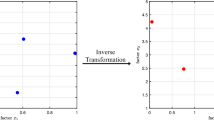Abstract
This paper deals with the generation of balanced incomplete block designs (BIBD), a hard constrained combinatorial problem with multiple applications. This problem is here formulated as a combinatorial optimization problem (COP) whose solutions are binary matrices. Two different neighborhood structures are defined, based on bit-flipping and position-swapping. These are used within three metaheuristics, i.e., hill climbing, tabu search, and genetic algorithms. An extensive empirical evaluation is done using 86 different instances of the problem. The results indicate the superiority of the swap-based neighborhood, and the impressive performance of tabu search. This latter approach is capable of outperforming two techniques that had reported the best results in the literature (namely, a neural network with simulated annealing and a constraint local search algorithm).
Preview
Unable to display preview. Download preview PDF.
Similar content being viewed by others
References
Colbourn, C., Dinitz, J.: The CRC handbook of combinatorial designs. CRC Press, Boca Raton (1996)
van Lint, J., Wilson, R.: A Course in Combinatorics. Cambridge University Press, Cambridge (1992)
Mead, R.: Design of Experiments: Statistical Principles for Practical Applications. Cambridge University Press, Cambridge (1993)
Buratti, M.: Some (17q, 17, 2) and (25q, 25, 3)BIBD constructions. Designs, Codes and Cryptography 16(2), 117–120 (1999)
Lan, L., Tai, Y.Y., Lin, S., Memari, B., Honary, B.: New constructions of quasi-cyclic LDPC codes based on special classes of BIDBs for the AWGN and binary erasure channels. IEEE Transactions on Communications 56(1), 39–48 (2008)
Corneil, D.G., Mathon, R.: Algorithmic techniques for the generation and analysis of strongly regular graphs and other combinatorial configurations. Annals of Discrete Mathematics 2, 1–32 (1978)
Gibbons, P., Östergård, P.: Computational methods in design theory. In: [1], pp. 730–740
Bofill, P., Guimerà, R., Torras, C.: Comparison of simulated annealing and mean field annealing as applied to the generation of block designs. Neural Networks 16(10), 1421–1428 (2003)
Prestwich, S.: A local search algorithm for balanced incomplete block designs. In: Rossi, F. (ed.) CP 2003. LNCS, vol. 2833, pp. 53–64. Springer, Heidelberg (2003)
Cochran, W.G., Cox, G.M.: Experimental Design. John Wiley, New York (1957)
Fisher, R.A., Yates, F.: Statistical Tables for Biological, Agricultural and Medical Research, 3rd edn. Oliver & Boy (1949)
Fisher, R.A.: An examination of the different possible solutions of a problem in incomplete blocks. Annals of Eugenics 10, 52–75 (1940)
Whitaker, D., Triggs, C.M., John, J.A.: Construction of block designs using mathematical programming. J. Roy. Statist. Soc. B 52(3), 497–503 (1990)
John, J.A., Whitaker, D., Triggs, C.M.: Construction of cyclic designs using integer programming. Journal of statistical planning and inference 36(2), 357–366 (1993)
Zergaw, D.: A sequential method of constructing optimal block designs. Australian & New Zealand Journal of Statistics 31, 333–342 (1989)
Tjur, T.: An algorithm for optimization of block designs. Journal of Statistical Planning and Inference 36, 277–282 (1993)
Flener, P., Frisch, A.M., Hnich, B., Kzltan, Z., Miguel, I., Walsh, T.: Matrix modelling. In: CP 2001 Workshop on Modelling and Problem Formulation. International Conference on the Principles and Practice of Constraint Programming (2001)
Puget, J.F.: Symmetry breaking revisited. In: Van Hentenryck, P. (ed.) CP 2002. LNCS, vol. 2470, pp. 446–461. Springer, Heidelberg (2002)
Meseguer, P., Torras, C.: Exploiting symmetries within constraint satisfaction search. Artif. Intell. 129(1-2), 133–163 (2001)
Prestwich, S.: Negative effects of modeling techniques on search performance. Annals of Operations Research 18, 137–150 (2003)
Street, D., Street, A.: Partially balanced incomplete block designs. In: [1], pp. 419–423
Mullin, C., Gronau, H.: PBDs and GDDs: The basics. In: [1], pp. 185–193
Wallis, W.D.: Regular graph designs. Journal of Statistical Planning and Inference 51, 272–281 (1996)
Bofill, P., Torras, C.: MBMUDs: a combinatorial extension of BIBDs showing good optimality behaviour. Journal of Statistical Planning and Inference 124(1), 185–204 (2004)
Chuang, H.Y., Tsai, H.K., Kao, C.Y.: Optimal designs for microarray experiments. In: 7th International Symposium on Parallel Architectures, Algorithms, and Networks, Hong Kong, China, pp. 619–624. IEEE Computer Society, Los Alamitos (2004)
Morales, L.B.: Constructing difference families through an optimization approach: Six new BIBDs. Journal of Combinatorial Design 8(4), 261–273 (2000)
Angelis, L.: An evolutionary algorithm for A-optimal incomplete block designs. Journal of Statistical Computation and Simulation 73(10), 753–771 (2003)
Author information
Authors and Affiliations
Editor information
Editors and Affiliations
Rights and permissions
Copyright information
© 2009 Springer-Verlag Berlin Heidelberg
About this paper
Cite this paper
Rodríguez Rueda, D., Cotta, C., Fernández, A.J. (2009). Finding Balanced Incomplete Block Designs with Metaheuristics. In: Cotta, C., Cowling, P. (eds) Evolutionary Computation in Combinatorial Optimization. EvoCOP 2009. Lecture Notes in Computer Science, vol 5482. Springer, Berlin, Heidelberg. https://doi.org/10.1007/978-3-642-01009-5_14
Download citation
DOI: https://doi.org/10.1007/978-3-642-01009-5_14
Publisher Name: Springer, Berlin, Heidelberg
Print ISBN: 978-3-642-01008-8
Online ISBN: 978-3-642-01009-5
eBook Packages: Computer ScienceComputer Science (R0)




